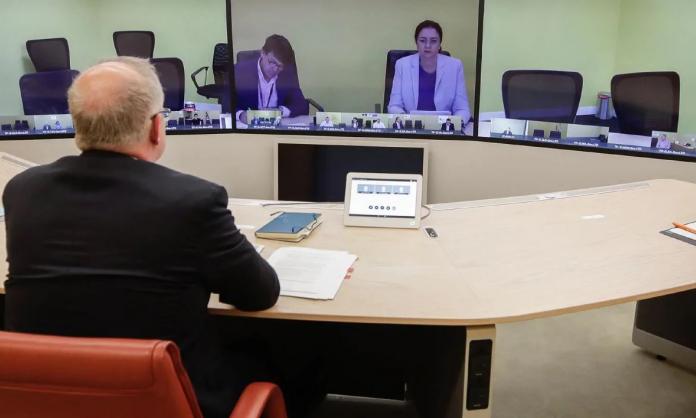Periods of crisis are often accompanied by a surge in support for a country’s most prominent political leaders and other figures of institutional authority. Political scientists call it the “rally ’round the flag effect”. It’s clearly happening in Australia during the COVID-19 pandemic.
Prime minister Scott Morrison is enjoying a surge in the polls. At the height of the bushfire crisis in January, his approval rating sank to 37 percent, well behind Labor opposition leader Anthony Albanese on 43 percent. In the latest Newspoll, released on 5 April, Morrison’s rating had surged to 60 percent, and he had jumped to 53 percent as preferred prime minister, far ahead of Albanese on 29 percent.
Morrison’s current approval rating is the highest for any Australian prime minister since Kevin Rudd’s during the global financial crisis in 2009. The turnaround in his popularity is perhaps the biggest in Australian political history. The poll to poll gain in Morrison’s net approval rating – which measures the percentage gap between those who approve of his performance and those who disapprove – is 38 percent. The next highest poll to poll gain by a sitting Australian prime minister occurred for John Howard in the month following the Port Arthur massacre in April 1996.
Morrison’s surge should come as no surprise to anyone who has followed Australian politics over the past month. Australia no longer has anything – either within the political sphere or more broadly in the mainstream of civil society – that warrants the label of “opposition”. In fact, it would be little exaggeration to say that Morrison is now at the head of a tacit political alliance incorporating the trade union movement, the Labor Party, the big business organisations and all but the most right-wing fringe of the corporate media.
Albanese has been more or less invisible. His main complaint to date has been that he wasn’t invited to be part of Morrison’s national cabinet, which comprises Morrison himself, the six state premiers and two territory leaders (out of which, five are from Labor and four from the Liberals). The most prominent Labor leader has been Victorian premier Daniel Andrews, who has inserted himself into the spotlight alongside Morrison.
Andrews clearly enjoys his status as a central figure in what is in effect a kind of national unity government. And while there have been some tensions behind the scenes, in public he has been strongly supportive of the PM. When asked by Guardian political editor Katharine Murphy about criticisms of Morrison’s sluggish response to the COVID-19 threat, Andrews replied:
“I think the PM is doing a fantastic job in very, very difficult circumstances. I sent him a text the other night to say no prime minister in our lifetime has had to face down something as significant as this, and that national cabinet is working extremely well, and this was a fantastic suggestion from him and we are all very grateful to be acting as one government almost, if you like, across the country rather than nine of us doing our own thing.”
ACTU leader Sally McManus has also caught the national unity bug. In an interview with the ABC’s Insiders program on 5 April, she was full of praise for the government’s proposed $130 billion JobKeeper wage subsidy. “We congratulate the government for the announcement”, she said. “The fact that we’re now consulting with the government means that better decisions get made because you’re listening to more voices.”
In a media briefing on 2 April, Morrison returned the praise, thanking McManus and the union movement in general for their engagement with the government around the JobKeeper program and other workplace issues: “There are no blue teams or red teams ... there are no more unions or bosses. There are just Australians now, that’s all that matters. An Australian national interest and all Australians working together”.
Attorney-general Christian Porter has shown similar enthusiasm for the newfound spirit of cooperation with the unions. “Behind the scenes, in a quiet and cooperative way, there have been a series of reforms to modern awards and the IR system”, he said. “We are here to thank the parties who have facilitated those changes. That is the ACTU, the Australian Industry Group, individual employer associations, individual unions like the SDA [the retail union], have changed terms and conditions for 2 million workers to ensure that tens of thousands of jobs have been saved.”
Australia’s most prominent political commentators are positively cock-a-hoop about the new situation. The ABC’s chief political writer, Annabel Crabb, for instance, in a piece published on the ABC website on 1 April, heaped praise on Morrison for “stepping out of the Fight Club” of “a parliament which has valued disagreement over consensus”.
“Every day as the scale of this present coal-black cloud grows across the globe, it’s harder to spot a silver lining”, she wrote. “But perhaps in this country it might be this: that in a time of crisis we formed a national decision-making body roughly half of which came from each of our two major parties, and decisions were made that were well outside the orthodox political comfort zone of the people making them, and that some loud voices shut up for a minute, in recognition that the situation was bigger than their own need never to give an inch.”
In her regular Friday column in the Conversation on 2 April, titled “Imagine if we could extract a permanent vaccine against hyper-partisanship from COVID-19”, Michelle Grattan struck a similar note: “Politicians and other political players have been able to go from fighting like alley cats over the most minor matters to cooperating on an extraordinary range of unprecedented initiatives ... A community thoroughly tired of knee jerk political aggression might ask: after the crisis is over, please could we retain some of this more productive approach?”
One might justifiably dismiss the pro-establishment musings of such thoroughly politically domesticated commentators as Crabb and Grattan as par for the course. Even a historically much more left of centre figure as Mike Carlton, however, has boarded the “national unity” train. On 2 April, he took to Twitter, attacking criticism of Morrison as “sniping and snarling from the cheap seats” and praising him for having “the courage and good sense to abandon the most barnacled neoliberal economic and societal beliefs and myths”.
The perception that Morrison has risen above partisan politics is no doubt a major factor in his popularity boost. The idea that the clash of interests and ideas in politics is just a messy distraction from the real work of effectively managing society for the good of all has been a common refrain of mainstream political commentators for decades. This view has become so entrenched, in fact, that we frequently witness the curious spectacle of politicians attacking their opponents for being too “political” and claiming that they themselves are much too honourable to be acting in pursuit of any political goal.
At a time of crisis like today, the anti-political sentiment can grow into a seemingly irresistible force. This is no reason for celebration. History shows that it’s exactly in moments of “national unity” that we should be most wary of those in power.
The outbreak of World War One in 1914 is a clear example. Governments across the combatant countries rode a wave of nationalist euphoria directly into the mass slaughter of the trenches. The 11 September 2001 terrorist attacks provide another cautionary tale. In the months following the attacks, US president George W. Bush enjoyed record-breaking approval ratings of between 80 and 90 percent, support he used to lead the United States into the disastrous misadventures of the “war on terror” and inaugurate the modern era of mass electronic surveillance and erosion of civil liberties.
Today’s crisis has very different dynamics. Elements of the government’s response – such as the wage subsidy, free child care and the boost to dole payments – are welcome. The danger lies in mistaking these temporary measures, designed to rescue capitalism from total collapse, for a fundamental change in world view.
The government Morrison leads is still very much the A-team of Australian big business. It’s the government of neoliberalism and union busting, of climate change denialism and the barbarous treatment of refugees. Morrison is still the man who, in January, steadfastly refused to countenance any serious action on climate change and blathered about the cricket while the entire country burned around him. That Morrison thought it entirely appropriate to appoint a mining magnate – former Fortescue Metals Group CEO Neville Power – to head up his COVID-19 commission tells you everything you need to know about his priorities. And it’s frankly criminal that Labor, the unions and the small “l” liberal commentariat would, in effect, put themselves at his service.
What we need today is less “national unity” and more unity and organisation of the working class. The further we’re led down the proverbial garden path of unity with the likes of Morrison, the less able we’ll be to resist those measures that, today and in the future, will be used to ensure that the burden of this crisis falls on the backs of workers and the poor.
It has become fashionable among left of centre commentators to talk about how, after this crisis and the drastic intervention by governments to help stave off economic and social collapse, there can be no going back to the neoliberal capitalism of the preceding decades. It may well be true that we’re living through the death throes of the neoliberal order, which was tottering even before the current crisis broke out. But to think that we’re all going to be marching arm in arm together towards the rosy dawn of a better, more equal and more just society is a pipedream.
If Morrison gets his way, the post-crisis world won’t be a light at the end of the tunnel, but something more like Orwell’s “boot stamping on a human face forever”. A world in which workers will be squeezed to breaking point to help restore the fortunes of the capitalist ruling class. And a world in which the repressive powers of the state, which over the past few decades have been expanded to monstrous proportions, will be unleashed against those who might dare to resist.
The current crisis, and the profound challenge it poses to the political parameters of global capitalism over recent decades, may well pave the way to a brighter future. But we won’t get there if we listen to the many “loud voices” encouraging us to put our trust in a government that, so we’re told, is managing society in the interests of all. To get there, we’ll have to fight like hell – not just against Morrison, but against the entire rotten “national unity” bloc that he currently leads.









